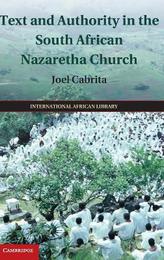
|
Text and Authority in the South African Nazaretha Church
Hardback
Main Details
| Title |
Text and Authority in the South African Nazaretha Church
|
| Authors and Contributors |
By (author) Joel Cabrita
|
| Series | The International African Library |
|---|
| Physical Properties |
| Format:Hardback | | Pages:418 | | Dimensions(mm): Height 235,Width 155 |
|
| Category/Genre | African history |
|---|
| ISBN/Barcode |
9781107054431
|
| Classifications | Dewey:289.93 |
|---|
| Audience | | Professional & Vocational | |
|---|
| Illustrations |
1 Tables, unspecified; 2 Maps; 10 Halftones, unspecified
|
|
Publishing Details |
| Publisher |
Cambridge University Press
|
| Imprint |
Cambridge University Press
|
| Publication Date |
24 April 2014 |
| Publication Country |
United Kingdom
|
Description
Text and Authority in the South African Nazaretha Church tells the story of one of the largest African churches in South Africa, Ibandla lamaNazaretha, or Church of the Nazaretha. Founded in 1910 by charismatic faith-healer Isaiah Shembe, the Nazaretha church, with over four million members, has become an influential social and political player in the region. Deeply influenced by a transnational evangelical literary culture, Nazaretha believers have patterned their lives upon the Christian Bible. They cast themselves as actors who enact scriptural drama upon African soil. But Nazaretha believers also believe the existing Christian Bible to be in need of updating and revision. For this reason, they have written further scriptures - a new 'Bible' - which testify to the miraculous work of their founding prophet, Shembe. Joel Cabrita's book charts the key role that these sacred texts play in making, breaking and contesting social power and authority, both within the church and more broadly in South African public life.
Author Biography
Joel Cabrita is University Lecturer in World Christianities at the University of Cambridge.
Reviews'Of the very many African-initiated churches that populated the continent's spiritual landscape from the beginning of the twentieth century, perhaps none is as prominent as the Church of the Nazaretha ... Academics have been particularly fascinated by the church in part because of its intentional fostering of Zulu tradition within the framework of evangelical Christianity. As a result it has come to be seen as a deeply conservative institution, one that acted as a bulwark against the presumably corrosive nature of modernity. In this remarkable study, however, Joel Cabrita pushes back against this characterization, arguing that far from simply embracing tradition, the Nazaretha reworked almost every aspect of their lives by espousing a living Bible; one in which a wide variety of written and oral sources combined with charismatic authority to produce a popular if volatile community of faith.' Robert J. Houle, The American Historical Review 'Text and Authority in the South African Nazaretha Church is clearly written, and each chapter surveys a different theme within the history of the movement. In this respect, the volume would work well in an upper level undergraduate or graduate course in African history or religious studies ... Cabrita's excellent book offers powerful insights into the history of cultural innovation and global Christianity in southern Africa.' Jonathon L. Earle, African Studies Review '... the study's major argument on the Nazaretha Church's Protestant inheritance is convincing and astoundingly accessible to readers unfamiliar with the group or South Africa's history and cultures. Evidence about everything from the cultural role of scribes to canon formation is not only thoroughly and skillfully dissected, but also pleasurable to read.' David Mihalyfy, Nova Religio: The Journal of Alternative and Emergent Religions '... by giving much evidence to sacred scripts Cabrita unfolds a strong and well-written narrative on the Protestant characteristics in the dynamics of African church independency. The argument directs readers to much underconsidered transnational perspectives and therefore revises well-established theoretical frameworks in the writing of Christian independent history in Southern Africa.' Andreas Heuser, Social Sciences and Missions
|